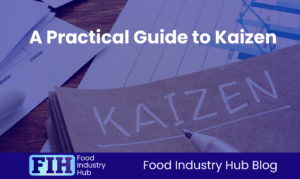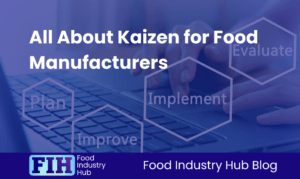
Sector-Specific Information
The Food Industry Hub knowledge centre delivers a wide range of sector-specific information for food industry professionals.
The below is one topic from our knowledge centre. You can return to all topics by clicking here.
Kaizen in Food Manufacturing
Definition
Kaizen, a Japanese term meaning “change for the better,” is a philosophy centred on continuous improvement. In the food manufacturing industry, Kaizen encourages organisations to make small, incremental changes to processes, systems, and behaviours to achieve long-term improvements in efficiency, quality, and safety. Unlike sweeping overhauls, Kaizen emphasises the power of minor adjustments made consistently over time, often driven by input from employees at all levels. This approach not only enhances operational performance but also helps to build a culture where innovation, accountability, and collaboration thrive, contributing directly to achieving stringent food safety and quality standards.
For food manufacturers, Kaizen can be applied to a range of circumstances, such as reducing waste, improving line efficiency, minimising downtime, and addressing non-conformances. For example, analysing bottlenecks in production lines through a Kaizen lens might uncover simple adjustments, like reconfiguring workflows or implementing visual management tools, to enhance output without significant investment. The methodology also aligns well with HACCP principles, as it encourages regular review and refinement of processes to mitigate risks and ensure compliance with regulations. By embedding Kaizen into daily operations, food businesses can not only improve their bottom line but also strengthen their reputation for delivering consistent quality and safety to consumers.
Techniques and Methodologies Employed with Kaizen
Kaizen employs a variety of techniques and methodologies designed to identify inefficiencies, standardise processes, and drive continuous improvement. One widely used approach is the Plan-Do-Check-Act (PDCA) cycle, a structured framework for problem-solving. In the food manufacturing industry, this could involve planning a small change to address a production bottleneck, implementing the change on a trial basis, monitoring its impact on key performance indicators, and refining the process before scaling it up. This iterative method allows teams to experiment with improvements in a low-risk manner while maintaining a strong focus on measurable outcomes.
Another key methodology is 5S, which focuses on workplace organisation to enhance efficiency and reduce waste. The five steps—Sort, Set in Order, Shine, Standardise, and Sustain—are particularly effective in environments where hygiene and cleanliness are critical, such as food production facilities. For instance, implementing 5S might involve decluttering workstations, creating clearly labelled storage for tools, and establishing cleaning schedules to prevent contamination risks. Techniques such as root cause analysis, often using the “5 Whys” method, are also integral to Kaizen, enabling teams to pinpoint and address the underlying causes of recurring issues. By combining these practical tools with employee engagement and cross-functional collaboration, Kaizen empowers food manufacturers to make meaningful, sustainable improvements in quality, productivity, and compliance.
Practical Application
- Implementation in Food Manufacturing
- Workforce Engagement: Employees are encouraged to identify and suggest improvements in their work areas. For example, a packaging line operator might propose a change to reduce downtime between shifts.
- Standardised Work: Processes are documented and reviewed regularly to identify inefficiencies. In a bakery, this might involve refining the sequence of mixing, proofing, and baking dough to save time and resources.
- Cross-Functional Teams: Collaborative efforts across departments help address complex challenges. For instance, quality assurance, production, and maintenance teams might jointly improve allergen-cleaning protocols.
- Focus Areas
- Waste Reduction (Muda): Eliminating wasted time, materials, or effort, such as reducing ingredient overuse in production.
- Quality Enhancement: Improving consistency and reducing defects in finished products.
- Safety Improvements: Streamlining workflows to minimise the risk of workplace accidents.
- Energy Efficiency: Implementing measures like optimising oven temperature profiles or switching to energy-efficient equipment.
- Examples of Kaizen in Action
- Bottleneck Reduction: A beverage plant might apply Kaizen to reconfigure the filling and capping process, increasing throughput without significant capital investment.
- Yield Improvements: A meat processor may optimise cutting techniques to reduce waste while meeting customer specifications.
- Workflow Optimisation: A dairy plant might reorganise production lines to reduce the distance staff must travel during operations.
Related Concepts
- Lean Manufacturing: The overarching philosophy from which Kaizen stems, focusing on efficiency and waste elimination.
- PDCA Cycle (Plan-Do-Check-Act): A structured method often used in Kaizen initiatives for problem-solving and implementing changes.
- 5S Methodology: A foundational aspect of Kaizen, involving workplace organisation and cleanliness to improve efficiency and safety.
- Gemba: A Kaizen principle encouraging leaders to observe processes at the “real place” of work for deeper insights.
- Continuous Improvement Teams: Groups dedicated to identifying and implementing Kaizen projects within an organisation.
Expert Insights
- Cultural Transformation
- Kaizen emphasises employee involvement and empowerment, fostering a culture of collaboration and shared responsibility for improvements. This cultural shift can lead to sustained benefits in morale, engagement, and innovation.
- Challenges in Implementation
- Resistance to change can be a significant barrier in Kaizen adoption. Overcoming this requires clear communication of its benefits, management support, and consistent reinforcement of the value of small changes.
- Short-term disruptions may arise as new practices are integrated, but these are outweighed by long-term gains.
- Kaizen in Compliance and Safety
- In food manufacturing, regulatory compliance is paramount. Kaizen can be used to refine processes for meeting food safety standards, such as allergen segregation or microbial testing protocols.
- Safety hazards can also be addressed through Kaizen. For example, ergonomic improvements on production lines can reduce repetitive strain injuries.
- Leveraging Technology
- Modern food manufacturing facilities can use data-driven insights from IoT sensors, ERP systems, and automation tools to identify opportunities for improvement.
- Digital platforms can streamline the tracking and evaluation of Kaizen initiatives, ensuring consistent progress and visibility.
Conclusion
Kaizen is a powerful tool for driving continuous improvement in food manufacturing. By fostering a culture of collaboration, efficiency, and problem-solving, it enables organisations to adapt to evolving challenges, enhance product quality, and maintain a competitive edge. While the approach requires commitment and a shift in mindset, the benefits—ranging from reduced waste to heightened employee engagement—make it an essential strategy for any food manufacturer committed to excellence.
We regularly produce new content for food industry professionals, and the Food Industry Hub Mail Service is the best way to stay up to date with the latest additions.
Signup today to be added to the Food Industry Hub mailing list.
From The Food Industry Hub Blog
Expanding on this topic with related content from our blog.
A Practical Guide to Kaizen
 In food manufacturing, finding ways to improve efficiency, maintain quality, and reduce waste is critical to staying competitive. This is where Kaizen, a Japanese philosophy of continuous improvement, offers a compelling solution. By focusing on small, incremental changes rather than sweeping overhauls, Kaizen enables food manufacturers to tackle challenges systematically while fostering a culture of collaboration and innovation. Whether you’re aiming to streamline production lines, enhance food safety standards, or reduce operational costs, Kaizen provides a practical and proven framework for achieving sustainable improvements.
In food manufacturing, finding ways to improve efficiency, maintain quality, and reduce waste is critical to staying competitive. This is where Kaizen, a Japanese philosophy of continuous improvement, offers a compelling solution. By focusing on small, incremental changes rather than sweeping overhauls, Kaizen enables food manufacturers to tackle challenges systematically while fostering a culture of collaboration and innovation. Whether you’re aiming to streamline production lines, enhance food safety standards, or reduce operational costs, Kaizen provides a practical and proven framework for achieving sustainable improvements.
The beauty of Kaizen lies in its emphasis on people-driven solutions. By involving employees at every level and encouraging them to identify inefficiencies and suggest improvements, businesses can unlock valuable insights that might otherwise go unnoticed. Techniques like the 5S methodology, Gemba Walks, and Poka-Yoke are integral to Kaizen and particularly well-suited to the complexities of food manufacturing. These tools empower organisations to not only optimise processes but also build stronger teams and foster a shared commitment to excellence. For food manufacturers seeking to navigate today’s challenges and seize opportunities for growth, implementing Kaizen offers a path to long-term success.
All About Kaizen for Food Manufacturers

Food manufacturers face increasing pressure to improve efficiency and quality while reducing costs. In today’s competitive market, finding ways to optimise processes and enhance productivity is crucial.
That’s where Kaizen comes in. This continuous improvement methodology has been proven to make a significant impact in the food manufacturing industry. But what exactly is Kaizen, and how can it benefit your organisation?
With Food Industry Hub Management Systems, you can trust that your food safety processes are reliable, compliant, and audit-ready.









